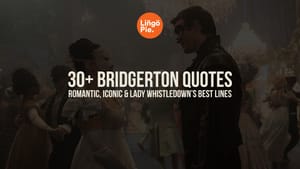With the live-action How to Train Your Dragon soaring into theaters this June, there's never been a better time to explore Dragonese. In fact, learning this fictional dragon language might even spark your interest in real languages—or even fun varieties like New Zealand slang—through platforms like Lingopie, right?
I mean, think about it... If Hiccup could bridge the gap between Vikings and dragons through language, imagine what you could accomplish by learning Spanish, French, or Japanese through your favorite shows and movies.
- 5 Languages You NEED To Survive In A John Wick World
- 15+ Japanese Karate Terms Every Karate Kid Fan Knows
- High Valyrian: Targaryen Speech Guide for HOTD Fans

What Is Dragonese?
Dragonese is the official language dragons speak in Cressida Cowell’s How to Train Your Dragon book series. Unlike the simplified dragon communication we see in the movies, the books present Dragonese as a complete language system with its own vocabulary, grammar, and cultural nuances.
The language features sharp shrieks and popping sounds, which become extraordinary when spoken by humans. Interestingly, this made-up language mirrors real language learning with different dialects, regional variations, and even ancient forms.
Who Speaks Dragonese In How To Train Your Dragon?
Very few characters in the How to Train Your Dragon universe can speak Dragonese fluently. Hiccup Horrendous Haddock III stands out as one of the rare humans who masters this dragon tongue, following in the footsteps of his ancestors (Hiccup the First and Hiccup the Second).
The ability to speak Dragonese becomes Hiccup’s primary skill throughout the series. While other Vikings rely on brute force and traditional dragon-fighting methods, Hiccup uses communication to understand and befriend dragons.
Later in the series, Alvin the Treacherous also learns Dragonese, though he uses it for conquest rather than friendship. The Druid Guardians and Northern Wanderers also understand it, showing that Dragonese knowledge often correlates with wisdom and a deeper understanding of the world.

Basic Dragonese Slang
Let's start with the fundamental Dragonese expressions you'd need for basic dragon conversation:
Howdeedoodeethere
This cheerful greeting means "hello" in Dragonese. Dragons use this casual expression when meeting friends or familiar faces, much like how different cultures have their own greeting styles.
Mama / Pappa
These simple terms mean "mother" and "father" respectively. Even dragons value family connections, and these words show the universal nature of parental bonds across species.
Yessee / Nee-ah
These mean "yes" and "no," the building blocks of any conversation. Dragons use these for quick agreements or disagreements, essential for basic communication.
Miaowla / Miaw miaw
This refers to cats, showing dragons have their own way of categorizing other animals. Dragons often use repetitive sounds, similar to how many real languages use reduplication for emphasis.
Yum-yum
This means "to bite," though it's often used more playfully than aggressively. Dragons use this when they want to nibble on something, whether it's food or a friend's finger.
Munch-munch
Simply means "to eat" or "eating." Dragons are quite straightforward about their dining intentions, and this word appears frequently in dragon conversations about food.
Pishyou
This polite term means "please," showing that dragons have their own concepts of courtesy and manners. Even the fiercest dragons use this when making requests.
Thankee
The dragon equivalent of "thank you," proving that gratitude exists in dragon culture. This word shows up often when dragons appreciate someone's help or kindness.
Di
This small but important word means "the." It's one of the most frequently used words in Dragonese, appearing in almost every sentence and phrase.

Intermediate Dragonese Expressions
Dragons have some wonderfully creative ways to express themselves, especially when it comes to bodily functions and emotions:
Cack-Cack
This blunt term means "poop," and dragons aren't shy about discussing bathroom matters. It's often used in warnings like "Nee-ah crappa inna di hoosus, pishyou" (No pooping inside the house, please).
Botti Bum
This refers to one's "bottom," and dragons frequently use this in playful threats or descriptions. Dragons seem particularly fond of discussing rear ends in their conversations.
Botty-crackers, Buttok-thunders, or Smelly-breezers
All of these colorful terms mean "farts." Dragons have multiple words for this natural function, showing their humor and lack of embarrassment about bodily functions.
Gobba
This means "to spit," and dragons use it both literally and as a command. You might hear "Pishyou keendlee gobba oot mi freeundlee?" (Please would you be so kind as to spit my friend out?).
Chuck-it-up
This phrase means "to be sick" or vomit. Dragons use this when they're feeling unwell or when someone else is about to lose their lunch.
Do di wobbly screamers
This dramatic expression means "to throw a tantrum." Dragons clearly recognize emotional outbursts and have a specific term for when someone's having a meltdown.
Do di screemi beserkers or Do di heebi jeebys
Both phrases mean "to lose your temper." Dragons understand anger management issues and have multiple ways to describe when someone's completely lost it.

Advanced Dragon Vocabulary
As you advance in Dragonese, you'll encounter more sophisticated terms that reveal dragon culture and values:
Da wingless
This is how dragons refer to humans, literally meaning "the wingless ones." It's a practical descriptor from a dragon's perspective, highlighting the obvious physical difference.
Dim-woof
Dragons call dogs "dim-woofs," which sounds remarkably similar to how dogs actually sound. This shows how dragons create words based on the sounds animals make.
Squeaky-snack
This somewhat ominous term refers to mice, combining their characteristic sound with their unfortunate position in the food chain. Dragons are practical about classifying their potential meals.
Pestistings
These are nanodragons, the tiny dragons that can be quite bothersome. The name suggests that even dragons can be annoyed by their smaller cousins.
Randifloss
This word means "rabbits," though the etymology isn't entirely clear. Dragons seem to have unique ways of categorizing different animals that don't always make sense to non-dragons.
Scrumlush
This enthusiastic word means "delicious," and dragons use it when they really enjoy their food. It's much more expressive than simply saying something tastes good.
Doubly yuck-yuck
The opposite of scrumlush, this phrase means "disgusting." Dragons aren't subtle about expressing their food preferences, using strong language for things they dislike.
Sleepy-Slab
Dragons call beds "sleepy-slabs," which perfectly describes their function from a practical dragon perspective. It shows how dragons create compound words to describe objects.
Do di chuckli ha-has
This phrase means "to laugh," and it captures the sound of laughter quite effectively. Dragons appreciate humor and have their own way of describing when something's funny.

Dragon Phrases for Social Situations
Dragons have developed specific phrases for common social interactions:
Me likee and Di out abba-me?
These phrases mean "I like you" and "Go out with me?" respectively. Even dragons experience romance and have their own ways of expressing attraction and asking for dates.
Swappa da yucki
This somewhat unromantic phrase means "to kiss." Dragons clearly have different standards for romantic expressions than humans, but the sentiment remains the same.
'es alright reely
This phrase means "to love," showing that dragons experience deep emotional connections. The casual phrasing makes it sound like dragons are somewhat shy about expressing strong feelings.
Do di onga
Simply means "to play," indicating that dragons value fun and recreation. This shows that dragon culture includes leisure time and games, not just hunting and flying.
Farin okey?
This friendly phrase means "How do you do?" and shows that dragons engage in polite social inquiry. Dragons check on each other's wellbeing, just like humans do.
Do di girly boo-hoo
This means "to cry," and the phrasing suggests that dragons might consider crying somewhat feminine. This reveals interesting aspects of dragon gender roles and emotional expression.
Ready To Start Speaking?
The key to successful language learning (whether it’s Dragonese or Spanish) is making it engaging and relevant to your interests. Hiccup didn’t learn Dragonese through textbooks but through real interactions with dragons he cared about. So if this conlang has sparked your interest, Lingopie offers the perfect next step!
Lingopie is a language-learning tool that connects you with content you actually want to watch. Love crime dramas? Learn Spanish through a telenovela. Fascinated by Japanese culture? Dive into anime and documentaries that feed your curiosity while building your language skills.
The interactive features mirror what made Dragonese learning successful for Hiccup. You can slow down dialogue when conversations get fast, replay scenes until you understand them, and build your vocabulary organically through context rather than rote memorization.
Want to give Lingopie a try? Sign up for a FREE 7-day trial today to test it out!







![19 Best Spanish Series For Learning Spanish Fast [2026]](/blog/content/images/size/w300/2025/04/best-shows-to-watch-to-learn-spanish.jpg)

